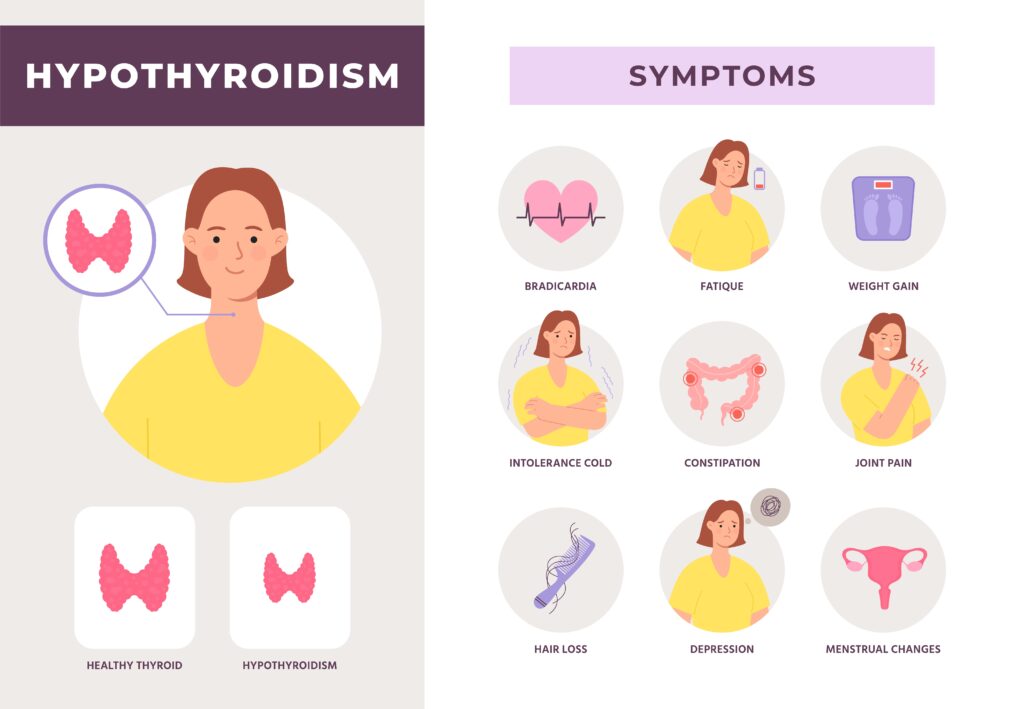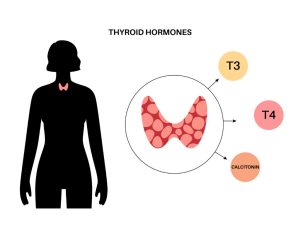
Like hyperthyroidism, hypothyroidism is a prevalent health condition affecting approximately 5% of the U.S. population, which translates to around 10 million people.
As the thyroid gland can affect several organs, particularly the heart, it’s important to understand more about this condition, what signs and symptoms to watch for, and how to treat it should symptoms arise.
In what follows, we’ll briefly define what hypothyroidism is, discuss its manifestations, explore its more general signs and symptoms, and discuss further about the details of this thyroid condition.
Overview of Hypothyroidism
Hypothyroidism, also described as underactive thyroid disease, is a condition that occurs when the thyroid gland does not produce enough thyroid hormones. Since thyroid hormone plays a critical role in the body’s normal function, an underperforming thyroid can lead to various health issues.
The risk of developing hypothyroidism increases with age. Other risk factors for its development include sex, family history, and overall health status.
Hypothyroidism is classified into three main types, each characterized by the severity of the condition, the stage of development, and the cause of the hormonal imbalance. These types include subclinical (primary) hypothyroidism, central (secondary) hypothyroidism, and hypothalamic (tertiary) hypothyroidism.
Signs and Symptoms of Hypothyroidism
It can be difficult to diagnose hypothyroidism due to the fact that it often shares many similar symptoms with other disease processes. Yet, when found in combination, many of the characteristics show a pattern that helps clarify the condition.

The following are the primary signs and symptoms of hypothyroidism:
- Fatigue: One of the most common symptoms of hypothyroidism is fatigue. This can be caused by a lack of energy and metabolism, which can make it difficult to perform daily activities. The thyroid hormone plays a vital role in regulating energy levels in the body, and a deficiency of it can lead to feeling tired and sluggish. This can also affect the person’s ability to concentrate and often leads to a general feeling of malaise.
- Weight Gain: Hypothyroidism can lead to weight gain, as the body’s metabolism slows down. The body begins to store additional unwanted fat, making it more difficult to lose weight.
- Dry Skin and Hair Loss: Hypothyroidism can also cause dry skin and hair loss. The lack of thyroid hormone can lead to dry, flaky skin. This happens because the lack of thyroid hormone causes decreased eccrine glandular secretion. These secretions are a natural moisturizer for the skin. In addition to this, the hair can also become brittle and start to fall out.
- Cold Intolerance: People with hypothyroidism may also have a lower tolerance for cold temperatures. This is due to the fact that the thyroid hormone plays a role in regulating body temperature. This is accomplished by effects of thyroid hormone on blood vessels. Control of blood vessel dilation affects heat loss from areas of the body. When thyroid hormone is low, the body’s internal temperature can drop, making the person more sensitive to cold temperatures.
- Depression and Difficulty Concentrating: Hypothyroidism can also lead to depression which can make it difficult to concentrate and focus. In addition, low thyroid effects such as weight gain and fatigue can worsen these issues.
- Memory Loss: Hypothyroidism can cause memory loss, making it difficult to remember recent events or retain new information. Thyroid hormone plays a role in cognitive function, and a deficiency can cause these issues.
- Constipation: Another common symptom of hypothyroidism is constipation. Like most symptoms, this is caused by a slowed metabolism which ultimately slows down a number of internal systems including the digestive process; as the metabolism slows down, so too does intestinal muscular function.
- Muscle Cramps and Nerve Tingling: Hypothyroidism can also cause muscle cramps and nerve tingling. This is caused by an imbalance of electrolytes in the body, which is common in those suffering from hypothyroidism.
- Slow Reflexes: Hypothyroidism causes slowed tendon reflexes due to its effect on calcium at the cellular level of muscles. This is an unusual sign and is very predictive of hypothyroidism.
Causes and Complications of Hypothyroidism

The underlying cause of hypothyroidism, as well as hyperthyroidism, is an imbalance of thyroid hormones. The thyroid gland produces less thyroid hormone, and the signs and symptoms described previously occur.
However, there are several potential reasons for the low thyroid hormone levels, including autoimmune disorders, medications, and environmental exposures. Other possibilities include thyroidectomy, iodine imbalance,
toxins, radioiodine therapy, and external neck irradiation.
Finally, hypothalamic-pituitary disease and primary thyroid disease are two of the main root causes of hypothyroidism. Both types of diseases can have a significant impact on health, and proper diagnosis and treatment is important for maintaining overall well-being.
Final Thoughts
Hypothyroidism is a health condition leading to multiple symptoms, side effects, and complications. With timely and effective treatment, however, symptoms can be managed, and potential complications can be alleviated.
